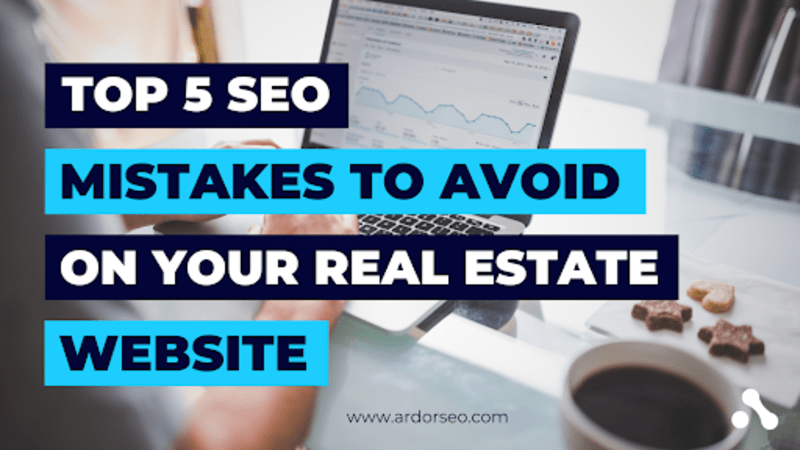
Search engine optimization (SEO) is a critical aspect of online marketing that helps businesses of all sizes to drive organic traffic, generate leads, and increase revenue.
Due to the intense competition in the real estate industry, having a strong online presence can help real estate agents to stand out from the crowd and attract more clients.
However, despite the importance of SEO for real estate websites, many real estate agents make common SEO mistakes that can hurt their online visibility and search engine rankings.
This article explores the top five SEO mistakes to avoid on your real estate website. But before we dive in, let's briefly examine the meaning of SEO and why it's important to real estate websites.
What Is SEO
Search engine optimization, commonly called SEO, entails optimizing your website's structure and content to rank higher in search engine result pages (SERPs). When someone uses a search engine to find a product, service, or information, they type keywords or phrases related to their search. The search engine then displays a list of web pages relevant to those keywords.
SEO increases your search engine ranking, helping your website appear at the top of those search results. If you're wondering, "what does SEO mean in real estate" SEO is crucial for real estate marketing.
It plays a vital role in ranking real estate websites, helping to increase visibility, traffic, and leads, ultimately leading to more sales. A well-optimized website can help establish your real estate business as an authority in your niche.
Local SEO optimization means optimizing your website to improve its visibility in search engine results pages (SERPs) for keywords related to your location.
The following are real estate agent SEO elements for optimizing your real estate website:
Keyword Research
To rank higher on search engines, research and use relevant real estate SEO keywords your target audience is searching for. Real estate keywords are the words or phrases people type into Google or other search engines when trying to conduct a real estate transaction or access industry information.
On-page Optimization
Prioritize optimizing your website's title tag, meta description, headings, content, images, and URLs to make them more search engine friendly.
Off-page Optimization
Focus on building high-quality backlinks to your website from other authoritative websites. That way, you improve your website's authority and increase its visibility in search engine results.
Local SEO
If you're a real estate agent, it's important to employ local SEO for real estate agents to optimize your website for local searches. Start by adding your business name, address, and phone number to local directories and optimizing your website for local keywords.
Real estate SEO is crucial for real estate businesses to attract more traffic, generate leads, and increase sales. By optimizing their website for search engines, real estate businesses can improve their online visibility and establish themselves as an authority in their real estate niche. It also helps to build brand awareness and credibility, leading to more business opportunities.
Importance of SEO for Real Estate Websites
Search engine optimization (SEO) is an essential component of digital marketing that involves optimizing a website's structure and content to rank higher in search engine results pages (SERPs). In the real estate industry, where competition is high, and potential clients rely heavily on online research, SEO for real estate is crucial to attract and convert leads into sales.
Here are some of the reasons why search engine optimization is important for real estate websites:
Increased Visibility
SEO is all about increasing the visibility of a website in search results. Optimizing a real estate website's content, structure, and keywords makes it more likely to appear at the top of search results when potential clients search for real estate services.
Increased Traffic
Improved visibility translates to increased traffic to a real estate website. When a website appears at the top of search results, it's more likely to receive clicks from potential clients, leading to more leads and, ultimately, more sales. A website not optimized for search engines may miss out on valuable traffic that goes to competitors instead.
Improved User Experience
SEO involves optimizing a website's content, structure, and design to make it more user-friendly, leading to an improved user experience and keeping potential clients on the website for longer while increasing the likelihood of conversion.
A website that's difficult to navigate or doesn't load quickly can frustrate potential clients, causing them to move to your competitors' sites.
Better ROI
Real estate agent SEO can provide a better return on investment (ROI) than other forms of digital marketing. By attracting more targeted traffic to a real estate website, the likelihood of conversion increases, resulting in a better ROI. SEO is also cost-effective in the long run compared to other forms of digital marketing, such as paid advertising.
Long-term Benefits
Unlike other forms of digital marketing, such as paid advertising, SEO marketing for real estate provides long-term benefits. Once optimized, a website can continue appearing at the top of search results, providing constant visibility and traffic. The visibility can result in consistent leads and sales over time.
SEO is crucial for real estate websites to increase visibility, attract more traffic, and generate leads. Real estate agents should improve their online presence and stand out in a highly competitive industry by optimizing their websites' content, structure, and design.
Top 5 SEO Mistakes Every Real Estate Agent Should Know
To understand the SEO mistakes to avoid, you need to know the effective real estate SEO tips capable of giving your website organic traffic and a higher ranking on the search engine results page.
Consider starting with an SEO audit to help determine the pages doing well and where you need to adopt another real estate SEO strategy for improvements.
Although performing a real estate SEO audit is often time-consuming, it helps you track your progress, giving you the necessary information to create a roadmap.
The following are the top five SEO mistakes most realtors make:

1. Not Conducting Keyword Research
One of the most common SEO mistakes real estate agents make is not conducting keyword research. Keyword research helps identify the words and phrases people use to search for your services. Without proper keyword research, it'll be difficult to know the right search terms for your website optimization.
Search engines rely on keywords to rank your website. To conduct keyword research, use various tools like Google Keyword Planner, Ahrefs, or SEMrush. These tools can help you find relevant keywords and phrases you can use to optimize your real estate website.
When conducting keyword research for your real estate website, focus on the following:
Location-based Keywords
Real estate is a local business, so it's important to incorporate local SEO for real estate in your website. Use location-based keywords in your content to increase organic search results.
For example, if you're a real estate agent in New York, use keywords such as "New York real estate," "homes for sale in New York," and "New York apartments for rent" to drive organic traffic to your site.
Long-tail Keywords
Long-tail keywords are longer and more specific search phrases people use to find exactly what they want. For example, "luxury homes for sale in New York City" is a long-tail keyword that targets a specific audience and is more likely to convert into leads.
Buyer and Seller Keywords
You can use buyer or seller keywords in your content depending on your target market. For example, if you're targeting home buyers, use keywords like "homes for sale," "real estate listings," and "buy a home." If you're targeting sellers, use keywords such as "sell your home," "real estate agent," and "real estate broker."
By conducting keyword research and using relevant keywords in your content, you can increase your website's visibility in search engine results pages (SERPs) and attract more qualified traffic to your website.
2. Neglecting On-Page Optimization
On-page SEO entails optimizing individual pages on your website to improve their search engine rankings and visibility. It includes optimizing title tags, meta descriptions, header tags, content, and internal linking.
Neglecting on-page optimization is another common SEO mistake real estate agents make. To avoid this realtor SEO mistake, focus on the following on-page SEO factors:
Title Tags
Title tags are the HTML tags that appear in the search engine results pages. They're the first thing people see when searching online. Ensure your title tags are descriptive and relevant, and include your target keywords to increase their visibility.
Meta Descriptions
When you type a command in search engines like Google, you'll find short descriptions below some title tags on the search engine result pages. These short texts are called meta descriptions.
One real estate SEO strategy to increase organic search results is to make your meta description informative and engaging enough to make people want to click on your website.
Header Tags
Header tags (H1, H2, H3, etcetera) are HTML tags used to structure the content on your website. Your real estate website will enjoy more visibility when you properly use your header tags and include your target keywords.

Content
The content on your website is one of the most important on-page SEO factors. To establish yourself as an expert in your field and grow your real estate agency, ensure your content is informative, engaging, and relevant to your target audience. Use your target keywords throughout your content, but don't overdo it. Aim for natural and organic use of real estate keywords.
Internal Linking
Internal linking refers to linking from one page on your website to another. Besides improving the user experience, internal linking helps search engines understand your website structure. However, ensure your internal links are relevant and add value to your content.
Optimizing your on-page elements will help you to improve your website's search engine rankings and visibility while providing a better user experience for your website visitors.
3. Focusing Only on Search Engines
Another common SEO mistake real estate agents make is focusing only on search engines. While search engines are important, remember that real people are the ones who will be visiting your website.
If your website isn't user-friendly, engaging, and informative, people won't stay on it for long and won't become leads or clients.
To avoid this mistake, focus on improving the user experience on your website by optimizing the following:
Website Design
Your website design should be clean, modern, and easy to navigate. Use high-quality images and graphics to make your website visually appealing.
Your real estate website should match your audience. For instance, if you're a luxury real estate business catering to high-net-worth individuals (HNIs), it should be evident on your real estate website. You can get a luxury real estate website that suits your potential buyers by engaging the services of leading website designers like Ardor SEO.
As an online marketing company, Ardor SEO specializes in search engine marketing and SEO, so your website will be optimized using the right keywords to rank higher on search engines.
Mobile Optimization
More people are using their mobile devices to search for real estate properties, so ensuring your website is mobile-friendly is crucial. A responsive website makes mobile search easy. Therefore, optimizing your website for smaller screens is best, making it easy to navigate on a mobile device.
Failing to optimize your website for mobile searches means you're leaving your prospective home buyers and sellers to your competitors, especially since statistics show that 60.67% of web traffic is from mobile phone users.
Website Speed
Website speed is essential to user experience and search engine rankings. Ensure each web page loads quickly, and remove any unnecessary elements that could slow down your website.
Content
Your content should be informative, engaging, and relevant to your target audience. Use images, videos, and other multimedia elements to make your content more interesting. Remember also to optimize your video content for more visibility seeing as 75% of web users watch short-form videos on their mobile devices.
By focusing on the user experience, you can improve your website's engagement metrics, such as bounce rate, time on site, and pages per session. These metrics are important for SEO because they indicate to search engines that your website is providing a valuable and engaging experience for your website visitors.
4. Ignoring Local SEO
Local SEO is a crucial part of SEO for real estate websites because it helps optimize your website for local search queries with location-based keywords such as "real estate agents near me" or "homes for sale in Los Angeles."
To optimize your real estate website for local search, focus on the following:

Google My Business
Google My Business (GMB) is one of the free SEO tools provided by Google that allows businesses to manage their online presence across the search engine. Claim and verify your GMB listing, create a Google business profile and optimize it with your business information, photos, and reviews to boost local SEO.
Local Keywords
As mentioned earlier, use location-based keywords in your content to optimize your website for local search. Use keywords like "real estate agents in Georgia," "homes for sale in Florida," and "real estate listings in Tennessee" to increase your website visibility to prospective home buyers.
Local Content
Create quality content specific to your location, including local market reports, neighborhood guides, and local events. You can also feature local businesses offering services your audience might want, such as mortgage lenders, property inspectors, real estate lawyers, and property management companies.
Local Backlinks
Backlinks are links from other websites to your website. To improve your local SEO, try to get backlinks from local websites such as local newspapers, blogs, and directories.
You can write real estate blog posts on the latest industry trends and link to authority websites in your location, or dedicate a blog post to home buyers looking to settle in your area.
5. Neglecting Off-Page SEO
Off-page SEO means optimizing your website's presence and authority on other websites. It includes tactics such as link building, social media marketing, and online reputation management.
Off-page SEO is important because it helps to improve your website's authority and credibility, leading to higher search engine rankings and more website traffic. To avoid neglecting off-page SEO, focus on the following tactics:
Link Building
Link building means acquiring backlinks from other websites. Backlinks are important because they indicate to search engines that other websites consider your content valuable and relevant. Some effective link-building tactics include guest blogging, broken links building, and resource page link building.
Social Media Marketing
Every serious real estate business knows that being active on social media is an effective marketing strategy for lead generation. Social media marketing can improve your website's visibility and engagement.
Therefore, use social media platforms like Facebook, Twitter, and LinkedIn to share your quality content, engage with your followers, and build your online reputation.
With more than 93% of web users on social media, you might want to pay more attention to optimizing your social media accounts.
Online Reputation Management
Online reputation management is the process of monitoring and managing your online reputation. It entails responding to online reviews, managing your business listings on review sites such as Yelp and Google My Business, and monitoring social media mentions of your brand.
FAQs
It can take several months to see significant results from SEO for your real estate website, as search engine algorithms take time to crawl and index your website's content.
However, consistently implementing best practices for off-page and on-page SEO can improve your website's search engine rankings and visibility over time.

You can use several tools to improve your real estate website's SEO, such as Google Analytics for tracking website traffic and user behavior, Google Search Console for monitoring website errors and search engine visibility, and SEMrush for keyword research and competitor analysis.
To measure the success of your real estate website's SEO efforts, track key performance indicators (KPIs) such as website traffic, search engine rankings, and lead generation.
Use tools such as Google Analytics and Google Search Console to monitor your website's performance and identify areas for improvement.
When searching for keywords for your real estate website, focus on targeting relevant and high-volume keywords, such as location-based and long-tail keywords.
Use tools such as Google Keyword Planner and SEMrush to identify keywords with high search volume and low competition and incorporate them into your website's content and metadata.
To optimize your SEO real estate website for mobile users, focus on creating a responsive and mobile-friendly web design, optimizing your website's speed, and providing a seamless user experience across different devices.
Use tools such as Google's Mobile-Friendly Test to identify and fix any mobile usability issues on your website.
Conclusion
SEO is a crucial aspect of digital marketing for real estate agents. Implementing effective real estate SEO strategies lets you enjoy more organic traffic and higher search engine results ranking on your real estate website.
You can improve your website's search engine rankings, visibility, and engagement by avoiding the common SEO mistakes mentioned here and implementing best practices for off-page and on-page SEO.
Remember to focus on providing value to your target audience in terms of quality content and user experience, and stay up-to-date with the latest SEO for real estate trends and best practices.If you're struggling with website visibility and ranking on search engines, it's time to pay attention to your site optimization. Consider getting real estate SEO services from real estate SEO experts like Ardor SEO.

